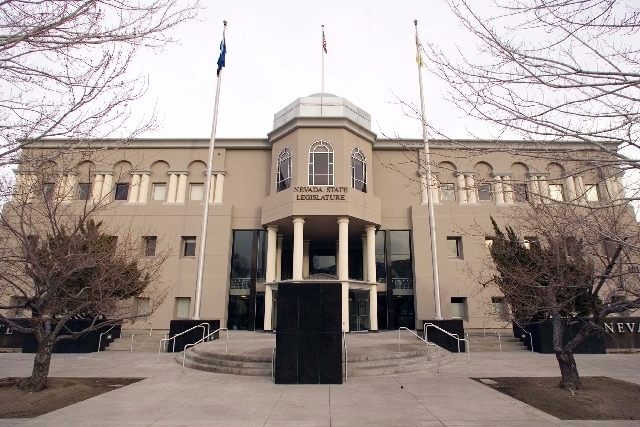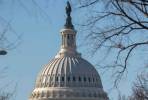Some local government officials want Nevada property tax cap lifted
CARSON CITY — Officials from cash-hungry local governments are calling for changes to the property tax cap that was enacted by the Legislature in 2005 when land values were soaring, but state policymakers don’t appear ready at this point to entertain wholesale changes to the formula in the 2015 session.
Assembly Speaker Marilyn Kirkpatrick, D-North Las Vegas, said she has had conversations with Southern Nevada governments and the Clark County School District about fixing what she called a loophole in the commercial property side of the tax cap that could generate some additional revenue. But fundamental changes to the 3 percent annual increases allowed for residential property and up to 8 percent for commercial property are not part of those discussions, she said.
Gov. Brian Sandoval said he is not considering the idea of changing the property tax cap law either as he prepares his 2015-17 budget.
“I’m not aware of any efforts, and it is not under consideration at this time,” Sandoval said.
Rocky Steele, assistant Clark County assessor, said homeowners probably would become “unglued” if there were any effort to revise or eliminate the current 3 percent cap on annual residential property tax increases.
Even so, some local government officials in Southern Nevada are advocating for the caps to be raised.
Any change to the caps that would increase property taxes would require a two-thirds vote in each house of the Legislature.
Goodman: Lift tax cap
Las Vegas Mayor Carolyn Goodman said she supports lifting the tax cap.
“Let’s look at it and get all the facts,” she said, urging a property tax review.
While she hasn’t lobbied anyone for tax cap relief, “I’m advocating for it.”
Told that most of the others on the City Council were against lifting the cap, Goodman said that was because they will be up for election. “We’re crippled if we don’t have the income,” she said. “This is something our city needs. Our hands are tied if we don’t have the taxes.”
Councilman Bob Coffin said he is open to looking at lifting the tax cap.
Councilman Ricki Barlow said no one has yet asked him to consider seeking a change to the cap. But he said the city is approximately $40 million in the negative and pointed to how the drop has created the problem in which the city and county haven’t been able to fully fund the Metropolitan Police Department.
“We’re looking at raising the fee structure which hasn’t been raised in 20 or 30 years,” he said. But that won’t be enough to cover the drop in property taxes caused by the cap.
“I’d at least look at it; we can’t say no,” Barlow said. “There’s nothing I can do. It’s a legislative decision. I believe everything is on the table.”
Other local government officials are interested as well but have stopped short of calling for changes to caps that limit the amount of property tax revenue generated for local governments and the school district.
Raising the residential cap of 3 percent to 4 percent for example, would not mean much of an increase in a typical homeowner’s tax bill. In an example provided by the county assessor’s office, a North Las Vegas home with a taxable value of $200,000 this year would see an annual tax bill of $2,348 based on the tax rate of 3.3544.
If the cap remained at 3 percent next year and the rate did not change, the tax bill would increase to $2,418. If a 4 percent cap was applied, the total would be $2,442 or about $23 more a year.
NORTH LAS VEGAS and henderson
North Las Vegas Mayor Pro Tem Anita Wood said her city has reached out to the Las Vegas Metro Chamber of Commerce for help pressing the tax cap issue in Carson City next year.
Wood hopes to see that partnership bear fruit as soon as possible.
“I understand why the tax caps are in place,” she said Tuesday. “I don’t think anybody wants to rip them off and have a free-for-all.
“Hopefully, one day, things will improve, and we’ll need them again. The question is what to do in the interim.”
City spokesman Mitch Fox doubts the city can do much to change the state’s position on tax caps ahead of next legislative session.
He said most council members, like Wood, have expressed little interest in lifting the caps completely despite an increasingly urgent need for a property tax windfall.
The city still has around $430 million in long-term debt obligations on top of an estimated $25 million in union employee pay raises city leaders will look to reduce with an out-of-court settlement.
Henderson, Las Vegas and Clark County have hired the consulting firm Applied Analysis to study the property tax issue and the effect caps are having on potential revenue.
Henderson has seen its property tax revenue drop from a high of $83.4 million in fiscal year 2009 to an estimated $58.5 million for the current fiscal year ending June 30. A Special Budget Ad Hoc Committee report presented to the City Council in February recommended a 20 cents per $100 of assessed value property tax increase to help bridge a $19 million annual operational and infrastructure shortfall.
City staff is reviewing the committee’s recommendations and will report back to the City Council in the next few months. The city could raise the property tax 3 cents, but a higher increase would require a change in state law or a vote of the residents. Henderson has the lowest property tax of the four large cities at 71 cents per $100 of assessed value. Reno’s is 96 cents, Las Vegas’ is $1.06, and North Las Vegas’ is $1.16.
Henderson spokesman Bud Cranor said the review by Applied Analysis is in its early stages, and he is unaware of any effort to create legislation at this time.
“We are working with the other local governments, but there is a lot of financial modeling and fiscal analysis that has yet to be done, and we don’t anticipate taking any kind of a position until that work is complete and Applied Analysis shares its findings and recommendations with legislative leadership,” Cranor said.
COUNTY: NO QUICK RECOVERY
Clark County Manager Don Burnette said officials are uncertain what the results of the initial exploration might be.
“I believe there’s legislative support for at least taking a step back and examining the issue, and where it ends up is anyone’s guess,” he said. “If you look at where we are this year compared to where we were in fiscal year 2009, when the property tax declines began precipitously, the county has lost about $126 million in property tax revenues.”
The county’s portion of property tax collections in fiscal year 2009 was $383.1 million. In 2013, it was $257.4 million. That reduction forced a reduction of more than 20 percent of the county’s workforce.
“You can’t reasonably expect Clark County to provide the same services and the same level of services we did four years ago,” Burnette said.
He added: “It’s going to take us decades to get back to 2009 levels.”
The issue of property tax caps is familiar to county commissioners. The Metropolitan Police Department’s property tax revenues have dropped by $58.3 million from 2009 to 2013. Those types of figures have emerged in discussions as commissioners weighed increasing the sales tax rate to pay for more officers in recent months. That More Cops proposal failed to pass the commission.
Commissioner Larry Brown said the issue merits a look early in the 2015 legislative session. The key, he stressed, is striking a balance that protects homeowners and eases the restrictions to better reflect current values of property. Brown said any legislative solution will be more complex than just removing the cap.
“You don’t want an overreaction,” Brown said. “You don’t want to simply say, ‘Let’s eliminate the cap.’ ”
He said more analysis of the property tax cap issue is needed before the specifics of a proposal can be crafted. Brown said he is glad to see work toward that goal already starting.
“The impacts are across the board,” said Brown, also a member of the Metropolitan Police Committee on Fiscal Affairs. The panel, made up of city and county officials, handles police funding issues. “It’s not only local government. It’s the school district. It’s Metro.”
Applied Analysis policy analyst Jeremy Aguero said a lot of people are talking about taxes and property taxes, but everything is in the preliminary stages.
“The goal here is to merely review the property tax in its entirety,” Aguero said. “Take a look at how it’s working, whether there are cleanup issues that are required. What the impacts would be under various modifications to the property tax, if any.”
While the Clark County School District has sought to increase its property tax revenue, officials have worked within the existing system and haven’t openly discussed or supported any plans to seek a raising of the property tax cap.
Efforts to work within the system have been unsuccessful as of late.
In 2012, the school district asked county voters to increase the property tax by 21 cents per $100 of assessed valuation, generating an estimated $669 million over six years for school improvements, renovation and new construction. Voters rejected the request 2-1.
The School Board debated making a similar request to voters in the upcoming November election, saying there is a dire need for renovations and new schools. But it decided to wait until 2016, at the advice of district staff who said the outcome probably would be the same as 2012.
KIRKPATRICK’S TAX FIX
Kirkpatrick said that instead of wholesale changes to the formula, she will propose changing provisions of Nevada law that have allowed some commercial property owners to go to the Clark County Board of Equalization and get property tax reductions because of business income losses.
For the coming property tax year, the county Board of Equalization just finished acting on commercial requests to reduce property values. State law says taxable value of property cannot exceed its full cash value and requires reductions to comply with this requirement.
The result was an approximately $1.5 billion reduction in property values for about 1,400 parcels on behalf of hundreds of business entities, from a total of $8 billion to $6.5 billion, according to information provided by the county.
The businesses now will be subject to the property tax cap based on the lower property values going forward, even if the property values increase more quickly in the years to come.
Kirkpatrick said the lower values should not continue in perpetuity as a basis for assessing property taxes. The lower values should only be good for a year, and property owners should have to make the case again the following year, she said.
Kirkpatrick said the actions of the Equalization Board also should be audited for consistency in how the board deals with requests for property value reductions. There are few checks and balances on how the board operates, she said.
“It is worth looking at the commercial piece that goes to the Board of Equalization,” Kirkpatrick said.
She requested a bill draft to address this issue in the 2013 session but never introduced a measure. She said she will raise what she called a parity issue for residential property again next session.
Even if a change is enacted, it won’t bring a financial windfall to local governments, Kirkpatrick said. North Las Vegas, for example, does not have a large amount of commercial property that would generate additional property tax revenues should the rules be changed.
Review-Journal writers Ben Botkin, who covers Clark County government; Jane Ann Morrison, who covers the city of Las Vegas; James DeHaven, who covers the city of North Las Vegas; Arnold M. Knightly, who covers the city of Henderson; and Trevon Milliard, who covers the Clark County School District, contributed to this report.

























